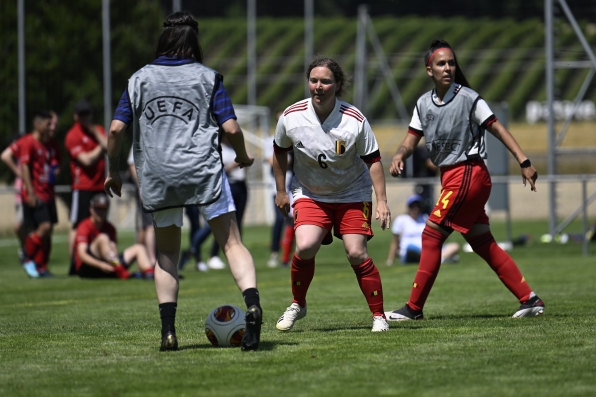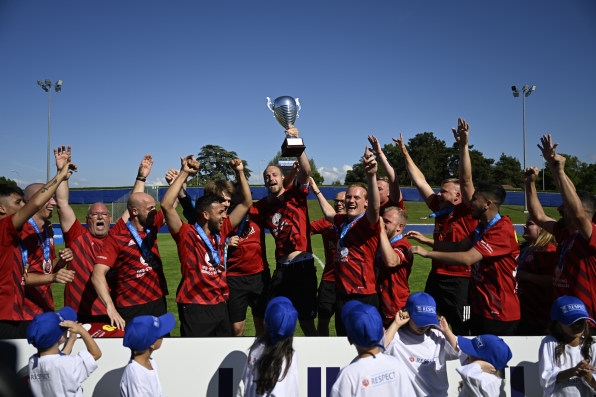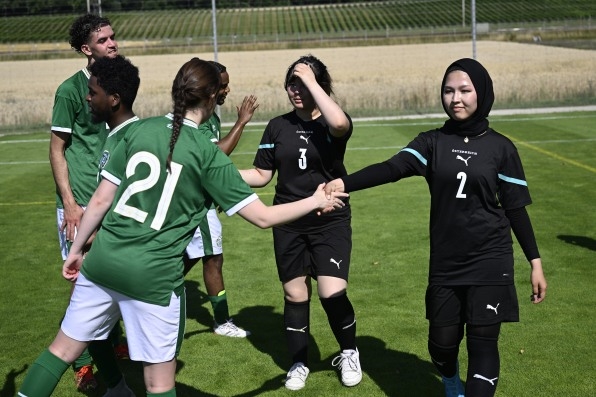At this European soccer tournament, teams of refugees and asylum seekers form new connections
When he was 14, Tareq Altorok came to Ireland alone as an unaccompanied minor, seeking a better future for himself. He left his family in his native Palestine and a life he felt was bereft of basic needs and any hope. Without school to attend much of the time due to the ongoing conflict, he and his friends whiled away time playing soccer in the road. And it was soccer that allowed him to flee. Ireland had granted him and his teammates visas to visit and represent Palestine in a friendly tournament. When there, he sought asylum.
This summer, Altorok, now 19, was one of many displaced people to take part in a new soccer tournament. The Unity Euro Cup was arranged by the Union of European Football Associations (UEFA), the governing board that, since 1958, has put on the prestigious European Championship, which pits national teams from across the continent against each other in what for many fans is the number-two competition after the World Cup. The brand-new tournament recreated the drama—but with teams made up of only refugees and asylum-seekers. The aim was to create connections between displaced people and their new communities, which can be hard to do in normal daily life. Players and organizers say the inaugural cup was competitive and fun, and could return in an expanded format.

UEFA’s partner was UNHCR, the UN’s refugee agency, which has been exploring ways for sports to help refugees integrate. In particular, it saw something in the power of soccer. It’s the most popular sport across the world, has relatively simple rules, and doesn’t require much to start a game—other than a ball, and four shirts as goalposts. And, it takes attention away from the differences between established and newly arrived populations. “When everybody plays football, no one really cares where you’re from, or what language you speak,” says Jody Clarke, UNHCR’s senior external relations associate. “It is a great leveler.”
Various European nations are already doing successful integration work through soccer. So, the organizers chose eight national teams from countries with a track record of those programs to go to Switzerland, the host nation for the tournament. For instance, in Clarke’s native Republic of Ireland, the Football Association of Ireland already partners with Tusla, the country’s support system for young people with refugee backgrounds, and provides local soccer programs, such as the weekly training sessions for unaccompanied minors in Dublin’s southside inner suburb of Ringsend. These players formed part of the team that went to the Unity Cup.
Other teams formed in similar ways. German players were recruited from a local team, FC Motor Neubrandenburg Süd, which is largely comprised of players with migratory backgrounds, and aims to help refugees integrate in a rural community. In Austria, players came from a group called Kicken ohne Grenzen, which uses soccer to unify disadvantaged youth in the country. In Italy, the team was partly drawn from the RETE Project, mainly Senegalese refugees, who joined forces with three female professional players who fled Afghanistan and found refuge in Florence and now play professionally in an Italian league. For those young women, suddenly torn from everything they know, it’s been a way to learn Italian and make Italian friends.

Each team brought an “ambassador,” basically a coach, some of whom are well known in the sport, such as Italy’s Demetrio Albertini, the former player who himself reached the final of Euro 2000 (only to lose to France in extra time). Teams and ambassadors gathered at Colovray Stadium in Nyon, Switzerland, for the competition on June 29. Like the real Euros, it was comprised of play-in-group stages, and then a single-elimination tournament, but all compressed inside a single day. Teams were made up of both men and women—70% refugees and 30% nationals without refugee backgrounds.
Altorok, on the Irish team, has played soccer since his days in Palestine, where it was a respite from a perilous life on the Gaza Strip. He says he’s been through four wars and always lived in fear of getting killed, a fate that many of his close friends met. “Once I step in the pitch, I just feel peaceful,” he says. “It brings the joy in my life.”
His journey to Ireland four years ago was not easy, requiring him to get past fighting in Sinai between Egyptian forces and ISIS on his way to Cairo airport. But Ireland, a country historically welcoming to Palestinians, granted him asylum and a place to live and go to school. “They were very welcoming,” he says of his new home. “They were so helpful, so kind.” He’s now enrolled in a college course in civil engineering, and has played for three competitive soccer teams. When he got selected to play in the tournament, “I was very proud to be part of it, especially representing Ireland, the country that took me in their hands and took care of me,” he says. “I felt it is a way to pay off.”
He says the standard of competition at the Unity Cup was impressive, though it varied depending on the teams; most impressive were the Germans. Clarke agrees, and is reminded of the tongue-in-cheek quote by former England striker Gary Lineker: “Football is a simple game: 22 men chase a ball for 90 minutes, and at the end, the Germans win.” And, at the Unity Cup, Germany won, initially drawing with Switzerland 2-2 in the final, then emerging victorious from the penalty shoot-out. It was close, Clarke says, and the younger Swiss team was “running rings round the Germans” in the second half. But, not for the first time, the Germans found a way.

In comparison, Altorok says Ireland was less prepared. But the young man, who plays as an attacking midfielder, says they did better than expected, coming in fifth of eight. “We actually did well,” he says. “Everyone thought we were just going to be hammered.” He may have another chance to improve Ireland’s standing: it’s UEFA and UNHCR’s goal to run the tournament again, perhaps in a longer, extended format. But they also wanted to prove that these friendly competitions work to bring people together, and that they can be easily replicated on local and national levels. “It doesn’t cost a lot of money to run a football tournament,” Clarke says. “And, it certainly doesn’t cost anything to invite your new neighbors to come along and play a football match with you.”
For Altorok, it did bring people together. He bonded with players from all the nations, sharing their refugee stories, eating their native foods together, and dancing to music from different cultures. “Everyone had different moves,” he says. He now has friends in France, Germany, and Switzerland—many of whom complimented his prowess and said he had the ability to play professionally. (He considered that high praise because “they were ballers; they were so good.”) That camaraderie is hard to find in daily life, when refugees are often viewed as quiet and reserved. This gave them a voice. “It makes the refugees feel like they are something,” he says.
Until the next competition, Altorok is back in Ireland—where his family has now joined him, thanks to a reunification program. “Life starts to get better now,” he says. “There’s no fear of getting killed. It’s just so peaceful and safe.”
Fast Company , Read Full Story
(57)


